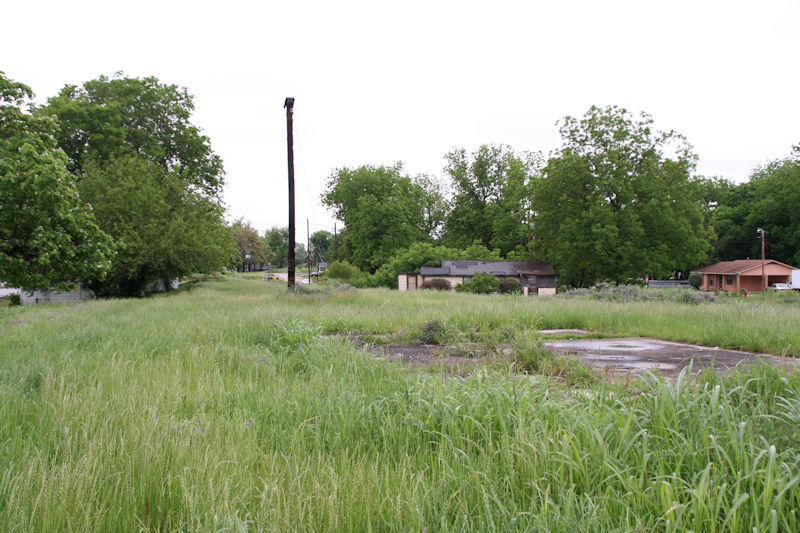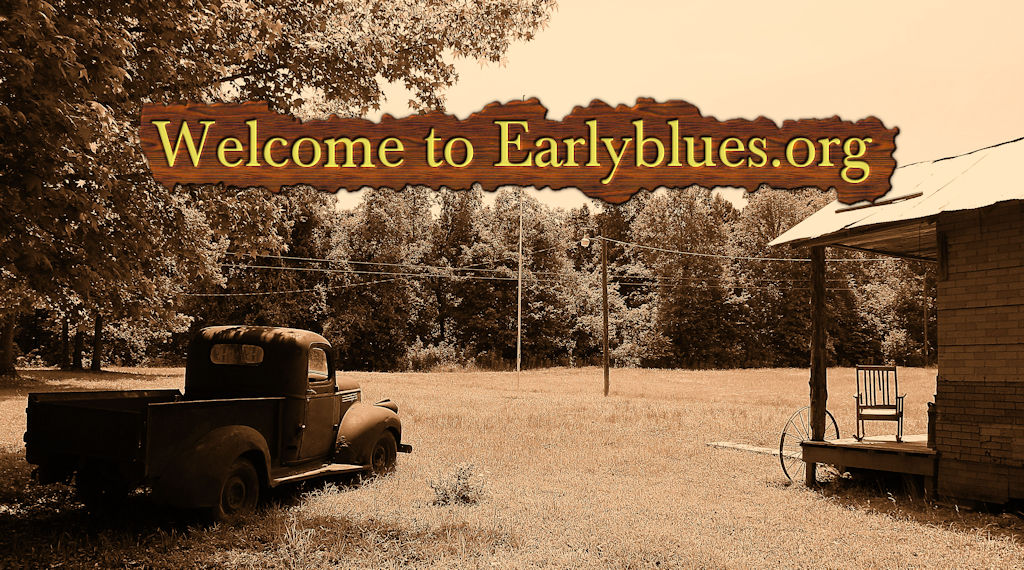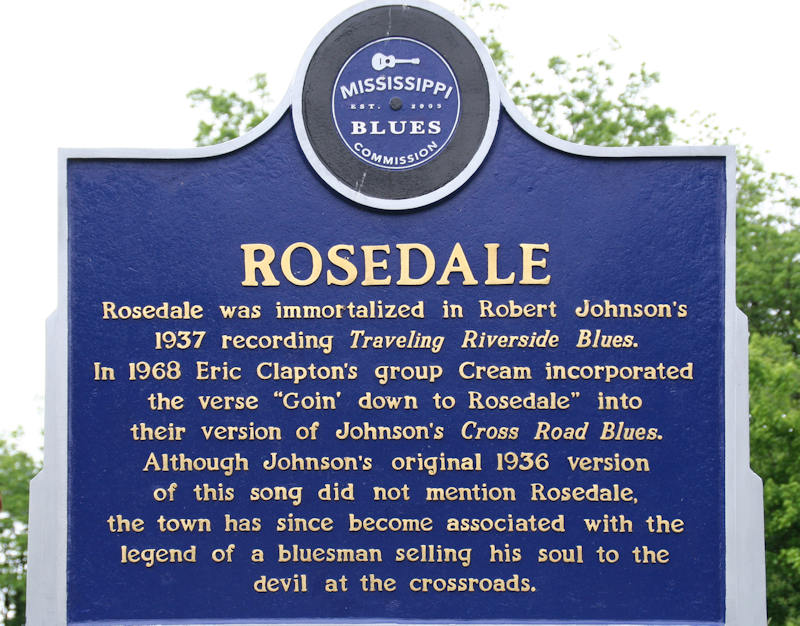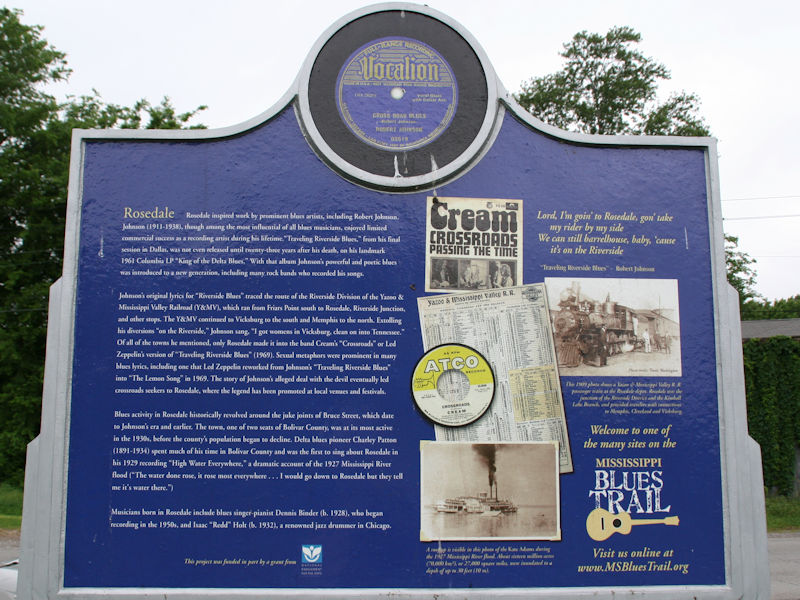Themed Photo Gallery and Information: Rosedale, Mississippi
History
This area in the nineteenth century was developed by European American planters for extensive cotton plantations, dependent on enslaved laborers. After the Civil War and emancipation, some freedmen managed to clear and buy land in the bottomlands, with many becoming landowners before the end of the nineteenth century. By 1910, a lengthy recession and declining economic and political conditions resulted in most blacks in the state losing their land. They could not compete with the financing gained by railroads, which were constructed in the area beginning in 1882. Many stayed in the area to work as sharecroppers and laborers. The railroad brought new business to Rosedale, which had a depot and shipped cotton to northern and other markets.
Beginning in the early twentieth century, tens of thousands of blacks left the state of Mississippi as part of the Great Migration, north by railroad to Chicago and other Midwestern industrial cities. During and after World War II, others went to California to work in the defense industry. Others remained where their families had lived for generations, with strong local ties.
In 2007, the Mississippi Blues Commission placed a historic marker at Rosedale’s former Yazoo and Mississippi Valley Railroad depot site, designating it as a site on the Mississippi Blues Trail. The marker commemorates the sites in the original lyrics of legendary blues artist Robert Johnson’s song “Travelling Riverside Blues”. He traced the railway route which ran south from Friars Point to Rosedale among other stops, including Vicksburg and north to Memphis. The marker emphasizes that a common theme of blues songs was riding on the railroad, which was seen as a metaphor for travel and escape from poverty and Jim Crow in the Delta. It also commemorates another common blues theme, life on the banks of a moody river bank, a theme heard in Charlie Patton’s “High Water Everywhere”.
Locals claim that Johnson sold his soul to the Devil at the intersection of Mississippi state highways 1 and 8, on the south end of town, and that he tells this story metaphorically in “Cross Road Blues.” Other artists have referred to his songs. Johnson’s deal with the Devil is mentioned as occurring in Rosedale in 1930 in an episode of the TV series Supernatural. However, a number of other Delta municipalities claim that the transaction took place in or near their boundaries.
Source: Wikipedia
Yazoo & Mississippi Valley Railroad – Mississippi Blues Trail Marker
Full text:
Rosedale was immortalized in Robert Johnson’s 1937 recording Traveling Riverside Blues. In 1968, Eric Clapton’s group Cream incorporated the verse “Goin’ dow to Rosedale” into their version of Johnson’s Cross Road Blues. Although Johnson’s original 1936 version of this song did not mention Rosedale, the town has since become associated with the legend of a bluesman selling his soul to the devil at the crossroads.
Rosedale inspired work by prominent blues artists, including Robert Johnson. Johnson (1911-1938), though among the most influential of all blues musicians, enjoyed limited commercial success as a recording artist during his lifetime.”Traveling Riverside Blues,” from his final session in Dallas, was not even released until twenty-three years after his death, on his landmark 1961 Columbia LP King of the Delta Blues. With that album Johnson’s powerful and poetic blues was introduced to a new generation, including many rock bands who recorded his songs.
Johnson’s original lyrics for “Riverside Blues” traced the route of the Riverside Division of the Yazoo & Mississippi Valley Railroad (Y&MV), which ran from Friars Point south to Rosedale, Riverside Junction, and other stops. The Y&MV continued to Vicksburg to the south and Memphis to the north. Extolling his diversions “on the Riverside,” Johnson sang, “I got womens in Vicksburg, clean on into Tennessee.” Of all of the towns he mentioned, only Rosedale made it into the band Cream’s “Crossroads” or Led Zeppelin’s version of “Traveling Riverside Blues” (1969). Sexual metaphors were prominent in many blues lyrics, including one that Led Zeppelin reworked from Johnson’s “Traveling Riverside Blues” into “The Lemon Song” in 1969. The story of Johnson’s alleged deal with the devil eventually led crossroads seekers to Rosedale, where the legend has been promoted at local venues and festivals.
Blues activity in Rosedale historically revolved around the juke joints of Bruce Street, which date to Johnson’s era and earlier. The town, one of two seats of Bolivar County, was at its most active in the 1930s, before the county’s population began to decline. Delta blues pioneer Charley Patton (1891-1934) spent much of his time in Bolivar County and was the first to sing about Rosedale in his 1929 recording “High Water Everywhere,” a dramatic account of the 1927 Mississippi River flood (“The water done rose, it rose most everywhere… I would go down to Rosedale but they tell me it’s water there.”)
Musicians born in Rosedale include blues singer-pianist Dennis Binder (b. 1928), who began recording in the 1950s, and Isaac “Redd” Holt (b. 1932), a renowned jazz drummer in Chicago.
Photo Gallery

Site of the Yazoo and MIssissippi Valley Railroad Depot


